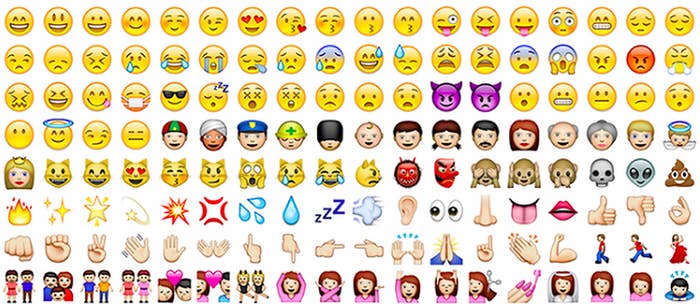
The Emoji Council Of Elders is about to get a little bit bigger.
As of today, Swiftkey, the predictive keyboard app for iPhone and Android, is officially part of the Unicode Consortium, the 24-year-old text encoding standardization committee that oversees and governs the evolution of emoji. As an associate member, Swiftkey will join companies such as Twitter, Apple, Adobe, Google, Microsoft, and Yahoo in helping the Consortium with the development of emoji in the coming years.
While the Unicode Consortium is a deeply technical and somewhat secretive organization, Swiftkey’s inclusion makes sense: The company plans to use its vast store of data, culled from Swiftkey use on more than 200 million devices, to give the UC a better understanding of global emoji use. Swiftkey appears to have been angling for this role for a while now and has issued numerous data-jammed emoji reports over the past year, analyzing 1.5 billion emoji across 30-plus languages. It’s a notable move for the Consortium, which, despite its influence, remains small and selective, and it’s one that will undoubtedly influence the evolution of one of the world’s fastest growing mediums of online expression.
Swiftkey’s induction to the Consortium comes at curious time for emoji. Since coming to the U.S. in 2007 as an official UC standardized character set, emoji have burrowed deep into our cultural sensibilities and linguistic habits. They’re used with dizzying frequency and by a broad swath of the globe, leading some, like Instagram data team member Thomas Dimson, to declare emoji’s popularity as “the rise of a new language.” Emoji occupies a powerful space in our collective ability to communicate across any pixelated medium, which makes its evolution a matter of deep cultural importance. The emoji alphabet’s inclusion and exclusion of certain ethnicities, sexual orientations, family structures, and cultural symbols — even mundane objects like tacos and champagne bottles — become stand-ins for their place in society at large.
This is all to say that the Unicode Consortium is in the rarefied and hard-to-comprehend position of presiding over the formation of rapidly growing means of global communication. From some angles, that's an odd undertaking for an organization the UC, which is, at its core, a technical group concerned with the standardization of character encoding schemes across dozens of languages, both dead and alive.
In a conversation with BuzzFeed News, Unicode Consortium co-founder and President Mark Davis, a longtime text software specialist and a current employee at Google, was the first to poke fun at this very fact, joking that, at first glance, “this is a very nerdy operation!” But, Davis promised, “everyone involved is here because they want to advance the ball, to make sure what whatever someone's language is, they can use Unicode on computers to write it."
That said, Davis was cautious to overemphasize emoji’s role in the way we communicate. “I wouldn't call it a language,” he said, suggesting a more subtle influence. “It's really to give a kind of flavor to our language, especially online and in social media. In some situations, [emojis] fill a gap that's covered in direct conversation by gestures or tone of voice. In conversation, smiles and facial expressions make our interactions a far richer."
The nuances of emoji and its evolution are more reason that the Consortium-Swiftkey partnership makes sense. The organization plans to take Swiftkey’s data — not just how frequently different characters are used, but how they’re used (positively, negatively, for religious expression, etc.) — to track emoji’s changes inside different cultures. Similarly, this data will play a large role in Consortium deliberations as it considers releasing new emojis — which Davis said it will continue to do at a rate of 50 to 100 per year. Currently, the UC uses data and suggestions from membership companies like Apple and Google as inputs to create new characters. “[Emoji] are not necessarily universal across cultures, as some might think,” Davis told BuzzFeed News. “Take the infamous eggplant in the US—you won't find that association in most countries of the world. Some of the pictures and some of the icon images were very specific to Japan and since, they've developed completely new meanings outside of Japan."
